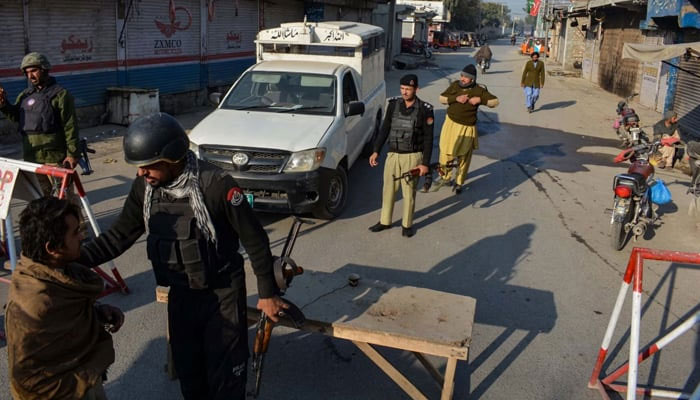November terror
KP remains most affected province, experiencing 50 militant attacks that resulted in 71 deaths and 85 injuries
This past November was a particularly difficult month for Pakistan’s security forces and its civilians. Pakistan Institute for Conflict and Security Studies (PICSS) data showed that terror incidents led to at least 245 fatalities and 257 injuries. Militant groups were also involved in the abduction of at least 11 individuals. The casualties include 127 militants, while 68 security personnel and 50 civilians were martyred. Security forces also apprehended at least 20 militants in November. By the end of the month, deaths due to militant attacks had exceeded the 1000 mark for the year, reaching a total of 1082. Khyber Pakhtunkhwa (KP) remained the most affected province, experiencing 50 militant attacks that resulted in 71 deaths and 85 injuries. The province has also seen clashes between opposing tribes in the Kurram area, leading to an estimated 120 deaths by the end of November. All in all, total militant attacks have risen from 645 in 2023 to 856 this year, an over 32 per cent rise, and there is still this month left to go. This underscores the challenges the nation faces on the security front and the difficulty in curbing the terror resurgence the country has been suffering from since the withdrawal of American forces from Afghanistan in 2021.
Getting things back under control will likely require a fine-tuning of the terror strategy. This will be hard to achieve without a broad-based political consensus and a security atmosphere where one does not have to worry about the capital being under siege every few weeks. Sadly, these are exactly the things that the country appears to be short of right now. It does not bode well when the chief minister of the province most affected by terrorism appears to be busier with planning and executing protests and getting into spats with law-enforcement agencies as opposed to working with them to better safeguard the people of his province. It is also worth looking at the mistakes that turned what should have been a victory against terrorism into a terror resurgence.
The PTI government years saw yet another olive branch being extended to militant outfits that have always remained adamant about their destructive goals and have shown no tangible signs of wanting peace. There is also the ability of anti-Pakistan terror outfits to use neighbouring Afghanistan as a safe haven and the interim Afghan Taliban government does not look like it is in a hurry to change this. Aside from not repeating the PTI government’s mistakes, the current government must convince the Afghan Taliban to tackle the safe-haven problem. It must be made clear that terrorism is not just a threat to individual nations but will jeopardise peace and stability throughout the region. It is also necessary for all stakeholders to form a consensus on the terror issue and to recognise the gravity of the situation. This is no time to destabilise the country over partisan politics. Whatever disagreements there may be, the terror problem threatens us all and has to be prioritised.
-
 Is Human Mission To Mars Possible In 10 Years? Jared Isaacman Breaks It Down
Is Human Mission To Mars Possible In 10 Years? Jared Isaacman Breaks It Down -
 ‘Stranger Things’ Star Gaten Matarazzo Reveals How Cleidocranial Dysplasia Affected His Career
‘Stranger Things’ Star Gaten Matarazzo Reveals How Cleidocranial Dysplasia Affected His Career -
 Google, OpenAI Employees Call For Military AI Restrictions As Anthropic Rejects Pentagon Offer
Google, OpenAI Employees Call For Military AI Restrictions As Anthropic Rejects Pentagon Offer -
 Peter Frampton Details 'life-changing- Battle With Inclusion Body Myositis
Peter Frampton Details 'life-changing- Battle With Inclusion Body Myositis -
 Waymo And Tesla Cars Rely On Remote Human Operators, Not Just AI
Waymo And Tesla Cars Rely On Remote Human Operators, Not Just AI -
 AI And Nuclear War: 95 Percent Of Simulated Scenarios End In Escalation, Study Finds
AI And Nuclear War: 95 Percent Of Simulated Scenarios End In Escalation, Study Finds -
 David Hockney’s First English Landscape Painting Heads To Sotheby’s Auction; First Sale In Nearly 30 Years
David Hockney’s First English Landscape Painting Heads To Sotheby’s Auction; First Sale In Nearly 30 Years -
 How Does Sia Manage 'invisible Pain' From Ehlers-Danlos Syndrome
How Does Sia Manage 'invisible Pain' From Ehlers-Danlos Syndrome -
 Halsey Mentions How She 'gained Control' Over Endometriosis Condition
Halsey Mentions How She 'gained Control' Over Endometriosis Condition -
 Teyana Taylor Says Choosing Movies Over Music 'dumb' Choice?
Teyana Taylor Says Choosing Movies Over Music 'dumb' Choice? -
 Poland Joins Spain In Move To Ban Social Media For Children Under 15
Poland Joins Spain In Move To Ban Social Media For Children Under 15 -
 Shia LaBeouf Sent To Rehab For Not Taking ‘alcohol Addiction Seriously’
Shia LaBeouf Sent To Rehab For Not Taking ‘alcohol Addiction Seriously’ -
 ‘Stingy’ Harry, Meghan Markle Crack Open A Chasm Despite Donation: ‘Do So At Your Own Peril’
‘Stingy’ Harry, Meghan Markle Crack Open A Chasm Despite Donation: ‘Do So At Your Own Peril’ -
 Research Explores How TikTok’s Recommendation System May Influence Teen Beliefs
Research Explores How TikTok’s Recommendation System May Influence Teen Beliefs -
 Google Wins Approval To Export South Korea’s High-precision Maps After 20 Years—With Strict Conditions
Google Wins Approval To Export South Korea’s High-precision Maps After 20 Years—With Strict Conditions -
 King Charles’ Health Battle: What Has Been Revealed About His Cancer So Far
King Charles’ Health Battle: What Has Been Revealed About His Cancer So Far




